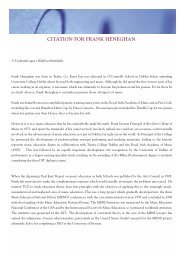TWICE THE SIZE - DIT Update - Dublin Institute of Technology
TWICE THE SIZE - DIT Update - Dublin Institute of Technology
TWICE THE SIZE - DIT Update - Dublin Institute of Technology
You also want an ePaper? Increase the reach of your titles
YUMPU automatically turns print PDFs into web optimized ePapers that Google loves.
But all has not been good news. To quote a leading observer <strong>of</strong> the times: “The <strong>Technology</strong><br />
Rubicon was nearly a Styx”. Ireland went <strong>of</strong>f the high-board during the 2010’s into the<br />
knowledge revolution. It carried out all the twists and somersaults to perfection. The pool<br />
metaphorically, however, was full <strong>of</strong> acid. The exponential explosion <strong>of</strong> information was simply<br />
too great to manage. Commercial expediency resulted in data being exploited before it<br />
became knowledge. Wider perspectives were never sought, or were otherwise unavailable. The<br />
‘bio’ industries experienced one catastrophe after another, and medicines released as wonder<br />
drugs were discovered to have transmissible, hereditary effects. Crop genetic engineering was<br />
another near disaster, both in terms <strong>of</strong> species corruption into useless mutations and<br />
uncontrollable contamination <strong>of</strong> the environment in the wild. Irish agriculture products were<br />
caricatured as “green but gross”, and huge international lawsuits emanated from almost every<br />
importing nation.<br />
Nevertheless, for the past five years or so, the emphasis has switched to an economic policy<br />
based on localist and cooperative values, favouring low-growth, low innovation, modular and<br />
sustainable practices. The fast-growing sectors <strong>of</strong> the economy are small-scale manufacturing,<br />
the arts and crafts, slow food, organic farming and heritage tourism. Services remain the most<br />
important area <strong>of</strong> the economy, but the sector has undergone significant change. As average<br />
household income is comparatively low, and people are tending to turn away from the<br />
materialistic, the demand for services is oriented increasingly towards fulfilling basis needs.<br />
Services targeted to high-income brackets, international markets and business-related services<br />
(marketing, corporate finance and management consultancy) tend to suffer. Personal services,<br />
such as health care, tourism, retailing, hospitality and leisure become increasingly localised. In<br />
the manufacturing sector the stress is on customisation, quality, service and reliability. The<br />
construction industry continues to be dominated by small firms, with a predilection towards<br />
traditional housing, but with a skill base that is greatly enhanced, leading to efficiency gains<br />
and high-quality products. Much <strong>of</strong> the manufacturing sector as a whole, however, remains<br />
labour-intensive, with a fragmented supply chain and low investment.<br />
Sustainability<br />
Over recent years, the Irish have become increasingly resource conscious and environmentally<br />
aware. Two prior decades <strong>of</strong> despoliation and degradation are the prime reason why. Attitudes<br />
changed dramatically around 2020 when something <strong>of</strong> a crisis point was reached. The world oil<br />
peak and consequent price escalation; a succession <strong>of</strong> coastal floods; and the outbreak <strong>of</strong><br />
disease due to poor bio-medical and genetically modified farming controls, all converged to<br />
convince a concerned populace <strong>of</strong> the need to change towards a more conservationist and<br />
sustainable approach.<br />
A brief interlude during the period 2021 to 2023 saw a Green Party led coalition government<br />
introduce successive legislation aimed at securing a path towards sustainable development.<br />
Idealistic, ambitious and autocratic, these measures were made moribund in their format at the<br />
time, being un-fundable from existing budgets and unrealisable in terms <strong>of</strong> promised time-scale.<br />
They did, however, mark a milestone and point the way. From 2024 onwards, the reforming<br />
126








